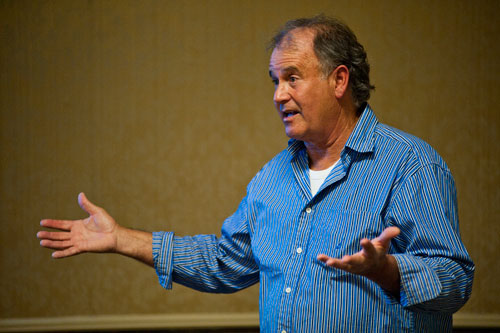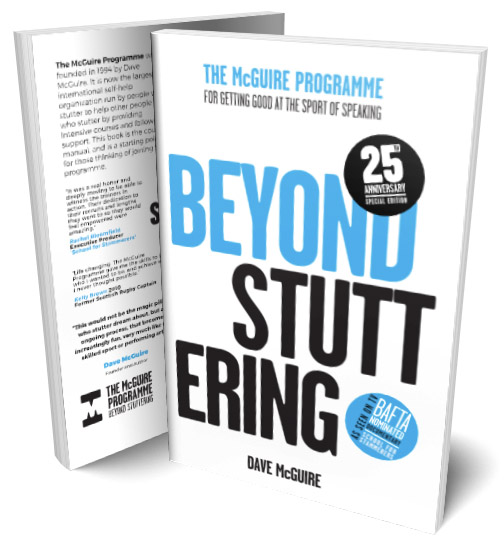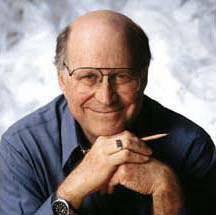Beyond Stuttering book by Dave McGuire
Get your copy of ‘Beyond Stuttering’, the training manual used by our members.
BEYOND STUTTERING

FOR GETTING GOOD AT THE SPORT OF SPEAKING
Revised and updated EDITION. The McGuire Programmes official MANUAL documents the internationally recognised method that not only improves speech, but offers the enjoyment of speaking.

Foreword By John Harrison
My first encounter with Dave McGuire and the McGuire Programme took place at the Fourth International Conference for People who Stutter, held in Linköping, Sweden, during the summer of 1995. As we chatted about common interests, I learned that Dave had previously run an innovative Programme for teenage boys with behavioural problems. Back in the 60s I had been an active sponsor of a similar kind of residential Programme for drug addicts. Both of us had seen that the only way to effect lasting behavioural change was to address the entire person.
Dave’s approach to stuttering combines his training in psychology with other stuttering therapies and sports psychology. Into the mix also went the know‑how gained from his experience of working with difficult teenagers. This eclectic background accounts, in part, for the uniqueness of the McGuire Programme. It’s also sets Dave apart from most others working in the field of stuttering remediation.
At the end of our initial conversation, Dave asked whether I would like to stop by and observe a demonstration of his Programme run with several of his graduates. I would indeed, and off we went to his workshop. My first impression of the workshop is still etched in memory – a group of men and women in a circle taking deep breaths with belts strapped around their chests. What in the world were they doing? I wasn’t sure what to make of it, but I was really curious. During further conversations at the conference, it became clear that Dave and I shared a common view of stuttering, and we promised to stay in touch once the conference was over.
I was intrigued with the McGuire Programme.
As someone who had stuttered for roughly 30 years and who had made a full and lasting recovery, I saw a strategy similar to what I, myself, had followed. As an émigré to California from New York in the early I960s, I had immersed myself in the personal growth movement that was flourishing on America’s west coast. I’d grown up with a very fuzzy image of myself and needed to change many beliefs and behaviours that did not serve me well. In working to build self‑esteem and get my own house in order, something very interesting happened: my stuttering gradually slipped away.
According to most speech therapists, this was not supposed to happen. The prevailing belief was “once a stutterer, always a stutterer”. But that was evidently not true, at least for some people. Over time, I saw that my stuttering was not simply a product of bad speech behaviours, it was also a reflection of who I was as an individual ‑ how I thought and felt, how I functioned, what I believed. My speech blocks had everything to do with the system of self that I had created, a system that supported a dysfluent way of speaking. Therefore, to make permanent changes in my speech, I had to address a total system that included my emotions, perceptions, beliefs, intentions, and speech behaviours. And it all had to be brought into alignment.
What so intrigued me about the McGuire Programme was that this was the first Programme I’d encountered that took a broad, holistic approach to stuttering and that touched on many of the same issues that I had addressed in my own process. Not only did the McGuire Method focus on the speech process itself, it also focused on the underlying factors that supported the stuttering behaviour.
What is clear is that overcoming a stutter is, for most, a difficult and challenging trip. It requires persistence, a clear commitment, a strong sense of dedication, and a willingness to repeatedly step outside your comfort zone. But given a hearty resolve, it is also clear that the McGuire Programme works. I invite you to open your mind and allow yourself to discover a total approach to the age-old problem of chronic stuttering.
John Harrison
Foreword By John Harrison continued . . .
This book will be useful to anyone who wants to gain a clear and detailed picture of what is involved in the recovery process. As you’ll discover, the road will take you through more than just changes in how to speak and how to manage speech blocks. It will help bring to awareness the subtle ways in which you’ve shaped your world to support your stuttering. You’ll also acquire a better sense of those issues that need to be addressed in order to break through into a newer, freer way of speaking. You’ll learn, not just about how to acquire fluency, but how to keep it. You’ll develop an understanding of the various factors that trigger relapses – why they happen, and what to do
You’ll learn, not just about how to acquire fluency, but how to keep it. You’ll develop an understanding of the various factors that trigger relapses – why they happen, and what to do about them. The text is full of sports analogies – highly appropriate, considering that speaking, like tennis, is a performance skill and subject to many of the same pressures and pitfalls. You’ll be introduced to various practice techniques needed to etch new speech behaviours into your psyche, and you’ll be offered various recovery strategies that you can fall back on when you run into turbulence and slip into relapse. Finally, you’ll gain a perspective on the “life games” that can either undermine or support your progress.
Can you overcome stuttering just by reading this book? That’s like asking, “Can you get from London to Bath by simply reading a roadmap?” In both cases, the answer is “not likely”. If you want to get from point A to point B, you need to put yourself in motion, commit yourself to the journey, and decide you won’t quit until you reach your destination. Some people have the discipline to make the trip themselves. Others will want assistance, either from a speech therapist, or by enrolling in one of the trainings presented by the McGuire Programme in various countries. But whatever your choice, this book is an excellent “map” that will help you proceed on your journey better informed and with a clearer set of objectives.
Since I995, I have been privileged to meet many members of the McGuire Programme, and I have observed several 4‑day trainings in there entirety. I’ve heard the members’ stories. I’ve seen the results. What is clear is that overcoming a stutter is, for most, a difficult and challenging trip. It requires persistence, a clear commitment, a strong sense of dedication, and a willingness to repeatedly step outside your comfort zone. But given a hearty resolve, it is also clear that the Programme works. I invite you to open your mind and allow yourself to discover a total approach to the age-old problem of chronic stuttering.
McGuire, Dave. Beyond Stuttering: The McGuire Programme – for getting good at the sport of speaking! Kindle Edition.
John C. Harrison Bio
John C. Harrison is no stranger to the problems of stuttering. He showed a marked dysfluency at the age of three and two years later underwent therapy at the National Hospital for Speech and Hearing Disorders in New York City. But this and later efforts at therapy during his school years were not successful and he struggled with stuttering throughout college and well into adulthood. Harrison’s involvement in a broad variety of personal growth Programmes over three decades have given him a unique insight into the nature and dynamics of the stuttering person. Today, he is fully recovered and no longer deals with a stuttering problem.
One of the earliest members of the National Stuttering Association, Harrison was an 18-year member of the Board of Directors and is currently the editor of the NSA’s monthly newsletter Letting Go. Harrison has run workshops for the stuttering and the professional communities across the U.S. and Canada as well as in Ireland, the U.K., and Australia. He has been published in Advance Magazine and the Journal of Fluency Disorders and has presented at conventions of the American Speech Language Hearing Association and the California Speech Language Hearing Association, as well as at the First World Congress on Fluency Disorders in Munich, Germany.

